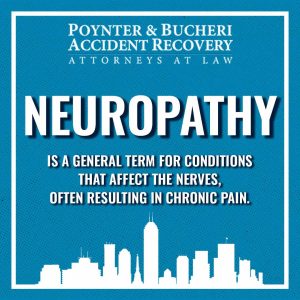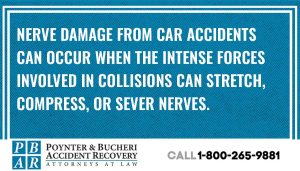
Nerve Damage from Car Accident Settlement: A Guide

At Poynter & Bucheri Law Firm, we understand that navigating the legal system can be overwhelming, especially when dealing with the aftermath of a car accident.
Our compassionate, experienced attorneys are here to guide you every step of the way and seek compensation that helps you heal.
In this comprehensive guide, we will explore everything you need to know about nerve damage from car accident settlements, from understanding how nerve damage affects you to proving economic damages.
What Is Nerve Damage from Car Accidents?
Nerve damage, or peripheral neuropathy, occurs when nerves are injured, leading to pain, numbness, and muscle weakness.
In the context of car accidents, nerve damage often results from the impact and trauma of the collision.
Common Types of Nerve Damage in Car Accidents

Pinched Nerve: A pinched nerve occurs when pressure is applied to a nerve by surrounding tissues, leading to excruciating pain and discomfort.
Neuropathy: General term for conditions that affect the nerves, often resulting in chronic pain.
Radiculopathy: Damage to nerve roots, commonly causing pain, weakness, or numbness in the limbs.
Whiplash-Associated Disorder: Often involves nerve damage due to the rapid back-and-forth movement of the neck, leading to severe pain and sensory disturbances.
Brachial Plexus Nerve Injury: Damage to the network of nerves that sends signals from your spinal nerves to your shoulder, arm, and hand, often causing weakness or numbness.
Sciatic Nerve Damage: Compression or irritation creates sciatic nerve damage, which runs from the lower back through the hips and buttocks and down each leg, causing pain and numbness.
Peripheral Neuropathy: Damage to the peripheral nerves, leading to symptoms such as tingling, pain, numbness, and weakness, particularly in the hands and feet.
Thoracic Outlet Syndrome: Compression of nerves in the upper chest area, causing pain, numbness, and weakness in the shoulders and arms.
Cervical Radiculopathy: Nerve damage originating from the cervical spine, leading to pain, numbness, and weakness radiating into the arms.
Lumbar Radiculopathy: Nerve damage originating from the lumbar spine, causing pain, numbness, and weakness in the lower back and legs.
Facial Nerve Damage: Trauma-induced nerve injury to the facial nerve, leading to facial paralysis, pain, or muscle weakness.
Ulnar Nerve Compression: Also known as cubital tunnel syndrome, this condition involves compression of the ulnar nerve at the elbow, causing numbness and tingling in the ring and little fingers.
Tarsal Tunnel Syndrome is a compression of the tibial nerve in the ankle that leads to pain and numbness in the foot.
Contact Poynter & Bucheri Law Firm at 1-800-265-9881 to discuss your nerve damage lawsuit and the average payout for nerve damage cases like yours.
Causes of Nerve Damage in Car Accidents

Nerve damage from car accidents can occur when the intense forces involved in collisions can stretch, compress, or sever nerves.
The most common injuries resulting in nerve damage include:
Whiplash: Sudden jerking motion of the head and neck can damage nerves by stretching or compressing them.
Blunt Force Trauma: Direct impact to the body can compress, stretch, or sever nerves, leading to significant damage.
Fractures: Broken bones can impinge on nearby nerves, causing compression or severance of nerve fibers.
Airbag Deployment: The rapid deployment of airbags can cause blunt force trauma to the face, neck, and upper body, potentially leading to nerve injuries.
Seatbelt Injuries: While seatbelts save lives, the force exerted during a collision can cause nerve compression injuries, particularly in the shoulder and abdominal areas.
Crush Injuries: When parts of the body are crushed during a collision, the pressure can severely damage nerves, leading to loss of function and sensation.
Penetrating Injuries: Sharp objects or debris from the accident can penetrate the body, directly damaging nerves and surrounding tissues.
Repetitive Stress: Prolonged exposure to vibrations or repetitive motions during an accident can lead to cumulative nerve damage, particularly in the hands and arms.
Dislocations: Joint dislocations caused by the impact can stretch or compress nerves that pass near the affected joints.
Spinal Cord Injuries: Severe impacts can damage the spinal cord, leading to nerve damage and permanent paralysis below the site of a severe injury.
Herniated Discs: The force of the collision can cause spinal discs to herniate, pressing on nerve roots and causing radiculopathy.
Muscle Strains: Overstretching or tearing muscles during a crash can lead to secondary nerve injury, compression, or entrapment.
Inflammation: Post-accident inflammation can cause tissue swelling, which can compress or irritate nearby nerves.
Vascular Injuries: Damage to blood vessels during an accident can compromise blood flow to nerves, leading to ischemic nerve damage.
Your medical prognosis, amount of medical costs, nerve pain, economic damages, and other factors will impact your settlement amount.
Medical malpractice from negligent medical treatment can also cause these types of nerve damage.
If you believe medical malpractice caused the victim’s injuries, contact us immediately so we can preserve the evidence in the doctor’s medical reports.
Speak with a Poynter & Bucheri car accident lawyer today at 1-800-265-9881 to discuss the average payout for nerve damage injuries sustained in accidents like yours.
Common Symptoms and Diagnosis of Nerve Damage
- Pain: Sharp, burning, or shooting pain in the affected area.
- Numbness: Loss of sensation in the hands, feet, or other areas.
- Muscle Weakness: Difficulty in moving or controlling muscles.
What Compensation Is Available For Nerve Damage?
Nerve damage can significantly impact the quality of the victims, causing physical pain and financial burdens.
Seeking a settlement for a damaged, severed, or pinched nerve can compensate you for the following:
Medical expenses: Medical treatment and rehabilitation costs, including future medical expenses related to the car crash.
Lost income: Income lost due to the inability to work while recovering or permanent damage resulting in the inability to work.
Pain and suffering: Compensation for the emotional and physical distress caused in a personal injury lawsuit by the injury severity.
Loss of consortium: Compensation for the injury’s impact on your relationship with your spouse or partner, including loss of companionship and support.
Loss of enjoyment of life: Compensation for the decreased ability to enjoy daily activities, hobbies, and other aspects of the victim’s life they can no longer enjoy.
Property damage: Reimbursement for damage to your vehicle and other personal property involved in the accident.
Rehabilitation and physical therapy costs: Coverage for physical therapy, occupational therapy, and other rehabilitation services needed to recover from pinched nerve damage.
Disability and disfigurement: Compensation for any permanent disability or disfigurement resulting from the nerve damage, impacting your ability to work or engage in daily activities. This can include partial or complete paralysis.
Travel expenses: Reimbursement for travel costs related to medical treatments, including transportation to and from the medical treatment appointments.
Home and vehicle modifications: Costs for necessary modifications to your home or vehicle to accommodate your severe injury, such as wheelchair ramps or specialized equipment.
Caregiver and assistance costs: Compensation for hiring caregivers or personal assistance needed due to the inability to perform daily tasks independently.
Legal fees and court costs: Coverage for the legal expenses incurred while pursuing your settlement, including attorney fees and court costs.
Evidence Needed to Determine Liability After an Accident
In a car accident settlement, reliable evidence is crucial to determining who caused the accident. Once liability is proven, your attorney can help you seek a fair payout for nerve damage.
To build a strong case for a nerve damage lawsuit, gather the following evidence:
- Medical records: Detailed documentation of your injury and treatment.
- Accident reports: Police reports and eyewitness statements.
- Photographic evidence: Photos of the accident scene, including minor and severe injuries.
- Eyewitness testimony: Statements from witnesses supporting your claim.
Poynter & Bucheri Law Firm helps accident victims recover compensation for a pinched nerve, damage to the nerve structure, or loss of bowel control due to spinal injuries. Call 1-800-265-9881 today or visit our website for a free case evaluation.
Factors Influencing Nerve Damage Settlements
- Severity of the nerve damage injuries: The severity of your nerve damage significantly influences the settlement amount for your nerve damage lawsuit.
More severe nerve injuries typically result in more medical bills and higher payouts due to intense, continued pain requiring extensive treatment, long-term or incurable disability, and the inability to perform everyday activities. - Medical expenses: Even the most common injury can result in ongoing medical care and rehabilitation, leading to substantial medical expenses.
These costs include immediate medical care, surgeries, physical therapy, and future medical needs, justifying higher settlement compensation amounts. - Lost wages and diminished earning capacity: If nerve damage prevents you from working, settlements may cover lost wages and diminished earning capacity.
This includes compensation for wages lost during recovery and the long-term impact on your ability to earn in the future, seeing that financial setbacks caused by the injury are addressed. - Pain and suffering: Calculating pain and suffering involves considering physical pain, emotional distress, and the impact on the quality of the victim’s life.
Chronic pain, anxiety, depression, and the loss of enjoyment in daily activities due to the injury are significant components that contribute to non-economic damages for the victim’s changes and suffering.
Average Settlement Amounts for Nerve Damage
The average payout for nerve damage from a car accident can vary greatly depending on the factors mentioned above and insurance coverage.
Nerve damage settlements range from $15,000 to over $100,000, with severe cases potentially reaching higher amounts for the most severe cases. The average payout for nerve damage settlements can vary widely.
Contact Poynter & Bucheri Law Firm at 1-800-265-9881 to see if your car accident will likely generate an above-average or average payout for nerve back settlement.
Maximizing Your Nerve Damage Settlement by Hiring the Right Personal Injury Attorney
Choosing an experienced car accident attorney is crucial to maximizing your nerve damage settlement and seeing that you get full and fair compensation.
Look for personal injury lawyers with:
- Proven track records: Success in handling a personal injury claim and other similar personal injury cases.
- Compassion and understanding: Your personal injury lawyer should have the ability to empathize with your situation.
- Strong negotiation skills: Expertise negotiating with insurance companies over a car accident claim.
Getting Maximum Compensation in Nerve Damage Claims
The first medical malpractice or car accident settlement offered is rarely fair, and it’s important not to accept it without discussing it with your attorney.
The at-fault insurance company often uses tactics to minimize payouts, such as:
- Denying liability: Claiming the accident was not their policyholder’s fault.
- Downplaying injuries: Arguing that your injuries are not severe.
- Delaying settlements: Prolonging the process to pressure you into accepting a lower offer from the insurance company.
Your personal injury attorney can expertly negotiate with the at-fault party’s insurance company and significantly increase your car accident settlement amount.
Here’s how you can help increase the potential compensation:
- Stay calm and professional: Maintain a respectful tone during negotiations.
- Understand your worth: Be aware of the value of your claim.
- Don’t rush: Take your time to see that you receive a fair offer.
Speak with an experienced lawyer at Poynter & Bucheri Law Firm at 1-800-265-9881 to discuss how we can stand up to the insurance company and get the compensation you deserve.
Frequently Asked Questions
How long does it take to settle a nerve damage claim?
The timeline for settling a nerve damage personal injury claim can also vary. On average, it may take several months to a year, depending on the complexity of the case and the parties’ willingness to negotiate.
Can I still receive a car accident settlement if I am partially at fault?
Yes, you can still receive a car accident or nerve damage settlement even after a motor vehicle accident, even if you were partially at fault. Indiana follows a comparative fault rule, meaning your compensation may be reduced by your percentage of fault.
What if my nerve damage symptoms appear long after the accident?
Nerve damage symptoms can sometimes appear weeks or months after an accident. It is crucial to seek medical attention immediately and document any delayed symptoms to support your claim.
Will my nerve damage settlement be taxable?
In most cases, your personal injury lawsuit settlements are not taxable. However, consulting with a tax professional to understand your situation is advisable.
Contact Poynter & Bucheri for Your Nerve Injury
Understanding nerve damage from a car accident and navigating the settlement process can be complex.
At Poynter & Bucheri Law Firm, we are dedicated to fighting for the compensation you deserve.
If you have suffered nerve damage from a car accident, our experienced attorneys are here to help you during the car accident lawsuit.
Contact us today for a free personal injury case evaluation, and let us help you focus on your recovery.
For personalized assistance with your nerve damage claim, contact Poynter & Bucheri Law Firm at 1-800-265-9881 to discuss securing compensation from the at-fault party’s insurance coverage.
